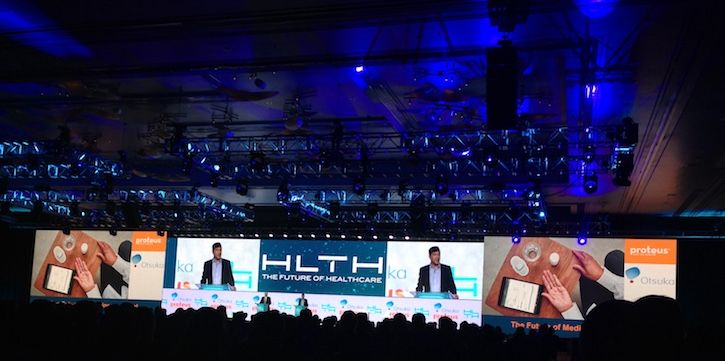Can the Digital Pill Quiet Pharma's R&D Nightmares?
Two of the men behind the invention argued that it could break the drug development cost curve.

Upon its approval from the FDA in November, 2017, Abilify MyCite was hailed as a revolution for prescription adherence. The first ever “digital pill” allows providers to track whether patients have taken and digested the antipsychotic medication as prescribed, using a novel sensor that pairs with a smartphone app.
At HLTH in Las Vegas today, 2 of the men whose companies helped develop the drug argued that it could also cut pharma’s famously-astronomical R&D costs substantially.
Kabir Nath, CEO of Otsuka Pharmaceutical’s North American business, and Andrew Thompson, CEO of Proteus Digital Health, made their case from twin podiums in a general session this afternoon. The 2 companies collaborated on the technology that makes digital pills possible.
Central to their speeches was the adherence gap. Cumulative adherence rates for all drugs covering all diseases is below 50%, they noted, and that complicates development both in clinical trials and after approval, as companies look to improve existing therapies and develop new ones. The industry pays substantial amounts to develop drugs that don’t have the impact that they could because they are not ingested when they should be.
“It’s not a defective patient problem, it’s a defective product problem,” Thompson said. The opportunity to monitor patient adherence would lead to quicker, less expensive clinical trials—and because the technology doesn’t have any known interactions and is found safe for use with various diseases and by pregnant women, it is generalizable to almost any drug.
Nath triumphed the difference. This is not the tweaking of the biology behind a drug, he said, but rather the corporation of tech and analytics. The ability to monitor when and whether a prescription has been taken will generate enormous datasets, which Thompson added will also be used to improve clinical trials and “change the way R&D gets done.”
There is no way of knowing if digital pill technology will actually, as Nath said, “break the cost curve,” for pharmaceutical R&D—although both men spoke confidently that it would—but the innovation could produce healthcare savings in other intriguing areas.
According to Nath, avoidable complications resulting from poor adherence—not to mention the cost of the drugs themselves—cost American healthcare as much as $500 billion a year. Fear that a patient will not adhere to a potentially beneficial treatment is sometimes cited as a reason that physicians don’t prescribe. He cited hepatitis C, a curable disease, as a common example. If the digital pill can assure physicians that the patient will actually get better, he argued, more patients will.
Related Coverage:
First "Digital Pill" Gains FDA Approval
Can Digital Pills Help Monitor Opioid Use?
How New Tech and Specialty Pharmacies Could Fix Prescription Adherence
Newsletter
Get the latest hospital leadership news and strategies with Chief Healthcare Executive, delivering expert insights on policy, innovation, and executive decision-making.